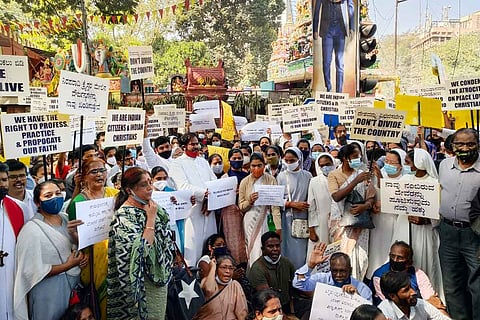

The debate on the Anti-Conversion Bill is back in Karnataka with the High Court accepting a public interest litigation (PIL) and issuing a notice to the ruling BJP against the implementation of the law by promulgating an ordinance.
On Friday, July 22, the High Court directed the state government to file objections with regard to the PIL challenging the government's move. The petition argued that the Protection of Right to Freedom of Religion Bill 2021 exhibited intolerance and questioned its constitutional validity. "Religious tolerance, equal treatment of all religious groups, and protection of their life and property and of the places of their worship have been held to be an essential part of secularism enshrined in our Constitution," read a petition filed by the Evangelical Fellowship of India and All Karnataka United Christian Forum For Human Rights. It added that the bill is an attack on democratic values which unite the country, and asked the court to pass an interim order directing a stay on arrests under the provisions under the ordinance.
A bench headed by Acting Chief Justice Alok Aradhe and Justice JM Khazi issued a notice to the Secretary of the Home Department and Principal Secretary of the Law Department. The bench has asked them to file objections within four weeks.
The petition states that the laws formulated under the Anti-Conversion Bill violate the right of choice of an individual, right of liberty and right to practice religion. The provisions of ordinance violate section 21 of the Indian constitution as it gives liberty to the state to violate individual rights of citizens.
"The impugned ordinance is a legislative attempt to strengthen the sentiment that marriages solemnized between persons born to different religions is a social evil which is being perpetrated by Muslim men who marry Hindu women, and that the same poses a threat to the Hindu community," the petition added.
Karnataka Protection of Right to Freedom of Religion Bill, 2021 popularly known as the anti-conversion Bill was promulgated as an ordinance in May 2022. The Bill has been passed by the Assembly but is yet to be presented in the Legislative Council, where the ruling BJP is one seat short of majority. However, the top leaders have decided to put the Bill into execution through an ordinance — which will have to be approved by both the houses within 6 months.
The bill introduced in Karnataka is even more stringent than those introduced in Uttar Pradesh, Madhya Pradesh and Gujarat, with the minimum punishment in Karnataka being three to five years and a minimum fine of Rs 25,000 — compared to a minimum of one-year jail term and Rs 15,000 fine in Uttar Pradesh. In addition to prohibiting conversion by or after marriage, the new Bill prohibits conversion by ‘promise of marriage’ as well.
The BJP government in Karnataka took a similar path while bringing in an anti-cattle slaughter law in the state wherein an ordinance was promulgated first before it was approved by both the houses.
The BJP’s bill prompted criticism from Opposition leaders and activists who opposed provisions in the bill. The Congress, the principal opposition in the state, said that it will launch an agitation against the bill. "Our party will firmly stand with each individual belonging to the minority community, those who are threatened by the government. The party will launch 'Jan Andolan' against the proposed bill," the Congress had announced.
The state government had tabled the proposed controversial Karnataka Protection of Right to Freedom of Religion Bill, 2021, popularly known as Anti-conversion bill in Legislative Assembly in Suvarna Vidhana Soudha at Belagavi on December 21, 2021. However, it is yet to come before the Legislative Council.
All legal entities, educational institutions, orphanages, old age homes, hospitals, religious missionaries, non-governmental organisations (NGO) are proposed to be brought under the purview of the legislation.
According to the provisions under the bill, any person who converts to another religion, their parents, siblings, or any other person who is related to them by blood, marriage or adoption or in any other form, associate or colleague may lodge a complaint of such conversion which contravene its provisions. The offense is made to be non-bailable and cognizable.